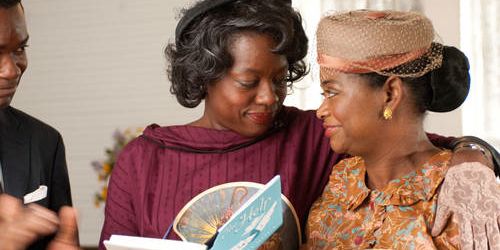Dear Viola: We Don't Hate The Player, We Just Despise The Game

Let's get this out of the way. I adore Viola Davis. I adore her gravitas, intellect and fearlessness, but above all, I adore her prodigious talent. For her merits, Davis deserves to be named alongside screen legends like Meryl Streep and Robert DeNiro. But alas the black, female body she inhabits prevents her from reaching the professional heights she so deserves. Ms. Davis as a radiant, 46 year-old woman, only came close to fully realizing her potential on film 3 years ago in her limited but remarkable role in Doubt. In a part so small it could nearly be called a cameo, Viola Davis wrought a compelling performance that earned her an Academy Award nomination.
Last year, Davis' lauded work in the film adaptation of The Help propelled her back into the spotlight. The magnificence of her portrayal of Aibileen is unquestionable though the film itself has been poked, prodded, and picked apart particularly by concerned black audiences and academics.
Pushback against the film forced Viola to take the defense. In an interview, she told Tavis Smiley all the way off saying his disdain for the film was a mindset that's "killing the black artist." Davis was nothing if not beautifully eloquent in her assertion that "the black artist cannot live in a revisionist place." You couldn't help but nod along as this brilliant Black woman argued her case.
Davis, of course, fails to take into account that Aibileen occupies the most loathsome of revisionist locales. Historians have noted that the tale of Minnie and Aibleen are not even close to accurate depictions of life in the Jim Crow south.
The most intelligent criticism of the film is based not on the fact that the women play maids but that they play mammies. Maids, you see, are real women whose stories deserve to be told with dignity and without shame. Mammies are fictive martyrs whose love for their white employers eclipses the economic and often sexual exploitation domestic workers endure(d). The Black women of The Help are the latter. (Melissa Harris-Perry explores this in our book club pick, Sister Citizen) The critique is a rejection of the ways white filmmakers have manipulated our stories to assuage their guilt or to suit their interests.
Related: Black Women Should Come Out of Hiding In Honor of Viola Davis
The story of The Help is appalling; the acting is sublime. Both Black and white filmgoers loved it which makes criticizing the movie in any manner like navigating a minefield.
I wanted so much to side with Davis during her showdown with Smiley, but she sidestepped the primary point. There's no doubt that film critics overwhelmingly celebrate the debasement and pathology of African Americans. While the more than 94% white and 77% male Oscar voters award the varied, complex performances of white actresses, it seems Black women are only visible when we are playing out our most damaging cultural mythologies. Smiley makes it clear that his frustration lies with the racist Hollywood system that dictates what makes it to theaters. Conflating that criticism with a dismissal of the actresses is misguided.
This is all none of Viola Davis' or Octavia Spencer's concern really. We place an unfair burden on black actors by asking them to constantly justify their professional choices. They are actors not activists. This is their craft, but it is also their job.
So when those of us who understand and appreciate the importance of media representation express our frustration at the film, its fabricated history, and the racist film industry it signifies, it is really, truly not personal. We want black actors to flourish and to explore the depths of humanity in new, untold stories. That is our tribute to great Black artists who spent their entire careers encaged, and that is the battle we all must continue to fight.
Kimberly Foster is the Editor and Publisher of For Harriet. Email her at Kimberly@ForHarriet.com with comments or find her on Twitter.

No comments: